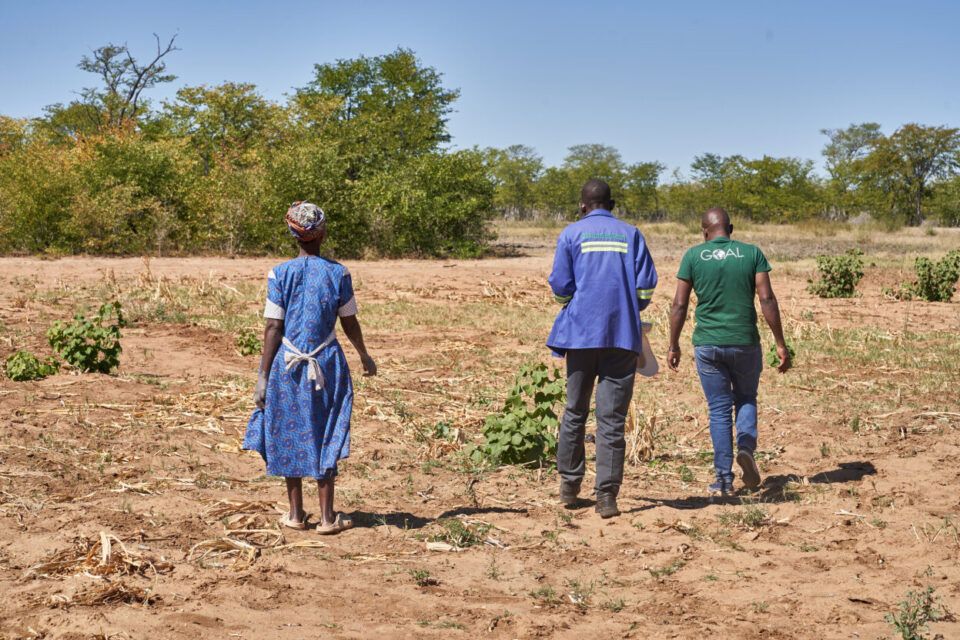 Press Release
Press Release
May 16, 2024 • 3 min read
6 million Zimbabweans will struggle to access food this year due to El Niño-induced drought, failure of season’s grain harvest and profound impact on livestock. GOAL calls on funding agencies to commence mobilizing and allocating resources, following declaration of national disaster.

"Urgent action and humanitarian support is required to provide essential relief and support to those affected by the drought"
Zimbabwe, along with many other neighbouring countries in southern Africa, is currently grappling with the dual crises of the 2023 El Niño weather phenomenon and the ongoing impacts of climate change. The emergence of El Niño has brought record breaking temperatures, leading to reduced rainfall, an extended dry season, and a significant drop in electricity production- a critical issue for Zimbabwe’s hydroelectric-dependent power supply.
The escalating temperatures due to climate change have intensified the frequency and severity of droughts in Zimbabwe. These erratic weather patterns disrupt the traditional agricultural calendar, resulting in increasing difficulty for subsistence farmers to cultivate crops and support their families. In early April, Zimbabwe became the third country, following Malawi and Zambia, to declare drought a national disaster. It is hoped that this declaration will enable the Zimbabwean Government to access additional resources urgently needed to address the crisis. The situation underscores the critical need for immediate and concerted efforts to mitigate the impacts of climate change on increasingly vulnerable communities in Zimbabwe.
Speaking about the El Nino effect on Zimbabwe, Gashaw Mekonnen, Country Director, GOAL Zimbabwe said,
“The current El Niño induced drought is expected to impact the food and nutrition security situation, reducing communities’ food access and diversity, and will worsen water shortages in Zimbabwe. The drought is also expected to increase the risk of gender-based violence (GBV), sexual exploitation and abuse. An estimated 7.6 million people require urgent humanitarian assistance and protection support to help recover their losses and rebuild resilience.”
“As a result, urgent action and humanitarian support is required to provide essential relief and support to those affected by the drought” continued Gashaw Mekonnen.
According to the UN Office for the Coordination of Humanitarian Affairs, the El Niño drought has also affected neighbouring countries in the Sub-Region in particular Zambia and parts of South Africa which have been important import locations for Zimbabwe over recent years. In response to anticipated production shortfalls across the region and other inflationary pressures, maize prices have risen significantly in the main markets across the country. This, along with reduced livelihood opportunities for poorer households in the agricultural sector, will negatively impact food access over the coming months. This will also negatively affect the nutritional status of children.
The severe drought conditions also have a profound impact on both livestock and wildlife in Zimbabwe. The dry season devastates their grazing lands, leaving them with limited resources for sustenance. As a result, many animals suffer from hunger and weakened immunity, making them more susceptible to infections and diseases.
Speaking about the declaration of the national disaster in Zimbabwe, Gabriella Prandini, Humanitarian Director, GOAL said,
“GOAL commenced operations in Zimbabwe in 2002 to respond to the food security crisis caused by severe crop failure due to early cessation of the rainy season, which caused the yield to reduce to 70% of the annual food requirements. The impact of the 2022 food crisis was felt by the most vulnerable populations in Zimbabwe for years to come. Currently one in four children in Zimbabwe is stunted, a condition that is not reversable. Having witnessed first- hand the impact of a delayed response, we urge the donor community and peer agencies to raise awareness and funding to prevent what will likely be a disastrous situation.”
References
The Zimbabwe Advocate stated El Niño, a cyclical weather pattern as a cause for the drought.
MSN.com: attributing the current Zimbabwe drought to Climate change.
Zimbabwe declares a state of disaster.




